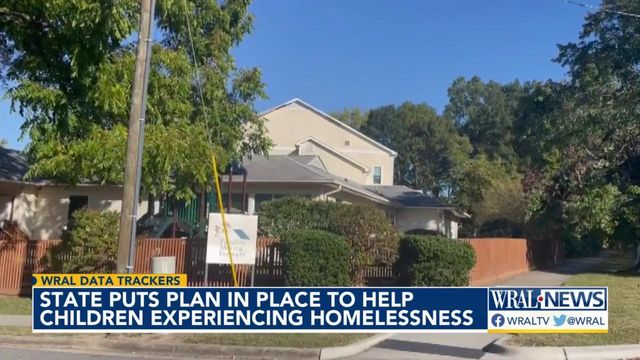Thousands of kids younger than 5 experiencing homelessness, state launches plan to address issue
In the shadow of Durham’s skyline, sits an emergency shelter called Families Moving Forward. On a given day, 20 families are relying on the shelter so they can have a roof over their heads.
"Families with these children are staying much longer because they need more affordable rent in our community and the trend is going away from that," said Tasha Melvin, the shelter's program director. "Resources are just limited in our community."
Melvin says it’s a tale of two different worlds for the community she’s working with and those in the buildings going up around the city.
"I can only imagine what that parent feels every time they see a new housing development go up that they cannot afford and all they want is a safe space they can afford to raise their child," Melvin said.
Dr. Mary Haskett, a North Carolina State University professor of psychology, agrees and says the Triangle's housing market is exacerbating issues for families in the region.
"The economics in our county right now – with the high cost of housing, the increased cost of food, cost of living overall - minimum wage isn’t keeping up with those rising costs so families are struggling," Haskett said.
Melvin says the Triangle's current housing market is increasing stress for families and providers.
"The biggest change has been our ability to move them into permanent housing quickly," Melvin said. "We are seeing families for much longer."
At the location Melvin works at, she says there are about 60 kids they're serving are younger than the age of 5.
"They're not engaging with children their ages," explains Melvin about the children who enter the shelter. "They're not learning how to write or hold pencils. There’s significant loss when they come to our shelter and we have to quickly implement something to get them back on track with their peers."
It’s estimated that statewide there are more than 32,000 children that young experiencing homelessness. There’s another issue too. While federal law requires schools to identify and serve children who are experiencing homelessness, it’s hard to track how many kids who aren’t in school are unsheltered.
"Until we have reliable, valid data on the number of young children experiencing homelessness, we’re not going to be motivated to make improvements in their lives and enact legislation that’s necessary to better support these families," Haskett said.
Resources for these children and families are often siloed. Haskett, who was part of creating the state’s plan addressing childhood poverty and homelessness, says making it easier to access services would help these children not fall through that means those children often fall through the cracks.











